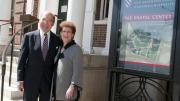The Radcliffe Institute for Advanced Study today announced that the Radcliffe Gymnasium has been renamed the Knafel Center in honor of venture capitalist Sidney R. Knafel ’52, M.B.A. ’54, whose most recent gift—the $10.5-million Knafel Fund—will support Radcliffe programs that convene faculty from across the University, as well as global scholars, to work together in private seminars, and will establish public programs. (Read more about Radcliffe’s seminars and other programs here.)
“A stronger Radcliffe contributes to a stronger Harvard,” said Knafel, who co-chairs the Radcliffe Campaign and is honorary co-chair of the forthcoming University-wide campaign. “A great university needs a place where thinkers from across its campus and around the world come together to take risks, explore new ideas, and connect theory and practice. At Harvard, the Radcliffe Institute is that place.”
Dean of the Radcliffe Institute Lizabeth Cohen, the Jones professor of American studies, said the center honors Knafel’s “longstanding and outstanding support for the Radcliffe Institute,” adding that he “thinks big” and his gift is “inspiring us all to unite big thinkers across disciplines and boundaries to connect in new ways with one another and the public.”
The fund, Harvard officials said, will support both the Radcliffe Institute and the University’s long-term mission as planning continues for the upcoming capital campaign, which is expected to launch later this year. (The Center for Government and International Studies’ Knafel Building, built in 2000 and located on the north side of Cambridge Street, was the result of a 1996 gift from Knafel.)
“Sid was one of the early—and great—supporters of the Radcliffe Institute and is among the University’s most deeply engaged citizens,” said President Drew Faust. “He is passionate about advancing Harvard, about supporting teaching and research, and about investing his resources wisely and well. I am pleased that one of our campus’s beloved spaces will bear his name as a lasting acknowledgement of his thoughtfulness and generosity.”
Built in 1898 for Radcliffe College, and renovated in 2005 as conference space for the Radcliffe Institute (founded in 1999), the Knafel Center—which has previously hosted an array of events such as the recent lecture by NPR journalist Melissa Block ’83, and a global meeting on the public-health threat of increased tobacco use—will undergo external renovations this summer.









